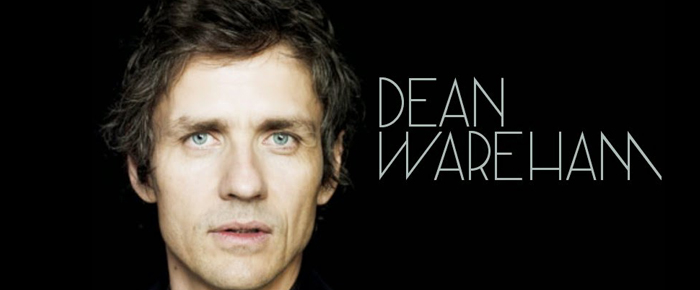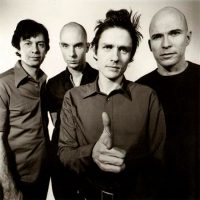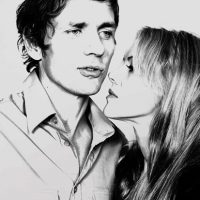
By Eleni P. Austin
Dean Wareham has been the driving force behind two influential Post-Punk bands, Galaxie 500 and Luna. After nearly 30 years in the record business, he has released his self-titled, solo debut.
Dean Wareham was born in Wellington, New Zealand. His family spent time in Sydney, Australia, before relocating to New York City in 1977. Even though the city was in decay, it was the birthplace of American Punk explosion.
Wareham attended Harvard University and connected with drummer Damon Krukowski and bassist Naomi Yang. The trio gigged around Boston and New York, recorded demos and released their first album, Today, in 1988, on the tiny Aurora label.
Galaxie 500’s lo-fi psychedelic sound was heavily influenced by 60s/70s touchstones like Velvet Underground and Modern Lovers, as well as Great Britain’s Spacemen 3. Following their debut, two albums, On Fire, and This Is Our Music, appeared in 1989 and 1990, respectively. But just as they were gaining momentum, the band suffered an acrimonious split.
Wareham immediately bounced back, forming the indie “super group” Luna, in 1991, recruiting ex-Feelies drummer, Stanley Demeski and former Chills’ bassist, Jason Harwood. In the band’s early days, Demeski didn’t have his own kit, so he permanently borrowed one from pal, Conan O’Brien.
Wareham had already inked a deal with Elektra Records and Luna’s first album, Lunapark arrived in 1992. The Velvet Underground continued to be a guidepost along with pioneering NYC Punks, Television. Building on the template created by those two iconic bands, Luna expanded their sonic palette.
On their second album, Bewitched, the trio became a quartet with the edition of second guitarist, Sean Eden. The sound became even more expansive, and the line-up lasted through their third album, Penthouse. Rolling Stone declared Penthouse one of the essential albums of the ‘90s. It included a knowing cover of Serge Gainsbourg’s “Bonnie And Clyde.”
Luna followed up with Pup Tent and Days Of Our Nights in 1997 and 1999, respectively. By 2000, bassist Jason Harwood left and was replaced by Britta Phillips. They recorded a live record, Luna Live, and two more studio albums, Romantica and Rendezvous. But the band called it quits in 2005.
By now, Wareham and Britta Phillips had married and recorded an album together: L’Avventura in 2002. It was produced by the legendary Tony Visconti, (David Bowie, T-Rex, Thin Lizzy). After Luna’s demise, the duo reconvened with Visconti in 2007 for Back Numbers.
Wareham has kept a low profile the last few years, touring, composing the score for Noah Baumbach’s film, “The Squid & The Whale” and writing his memoir, “Black Postcards.” Now he returns with his first solo album, produced by My Morning Jacket front man, Jim James.
The album opens with the propulsive chug of “The Dancer Disappears.” The skeleton of the melody recalls the Ronettes’ epochal “Be My Baby. Even though Wareham declares that he’s “now in the twilight of the psychedelic years,” he remains optimistic and engaged. “Bring back the magic and light the match, there’s a spark that I’m hoping to catch.”
The beatific melodies of “My Eyes Are Blue” and “Love Is Not A Roof Against The Rain” belie contemplative lyrics. The former employs circuitous guitar riffs that shimmer and jangle. The instrumentation pivots between tinkling vibes, plucked acoustic guitar and gliding pedal steel. The lyrics sketch out a cagey paean to unconditional love.
The latter is a haunting slice of spatial psychedelia. The tempo is slow and deliberate as Wareham takes emotional inventory…”what have I done with my life, what have I done to deserve this?”
Wareham ups the ante on both “Holding Pattern” and “I Can Only Give My All.” “Holding Pattern” offers a mordant meditation on stasis. Here Wareham equates the monotony of plane travel delays with the tedious AOR music of Kansas, Toto, Boston and Journey. The instrumentation here is anything but dull, blending a stuttering backbeat nimble bass runs and swirling synths. The droning guitar solo sparks and pinwheels, managing to be cyclonic, gritty and pretty all at the same time.
The melody of “I Can Only Give My All” shares musical DNA with Peter, Paul & Mary’s “Where Have All The Flowers Gone.” Anchored by a rigid typewriter rhythm and galloping synths, the guitars are a sonic wall of sound. Shifting between arch tremolo, modal fills and shards of Surf guitar, the riff-age is kaleidoscopic, down to the last fluttery chord.
Wareham is at his most beautiful covering Michael Holland’s “Heartless People.” His vocals are laconic, his tone derisive and misanthropic. But all that is cloaked in the echo and sway of this skewed minor key waltz. A loping meter and lovely arpeggios propel the action, building to a hushed crescendo.
Other interesting tracks include the lush and verdant “Beat The Devil.” Here, instrumentation is powered by a chirping Cicada rhythm, and a ringing 12 string guitar that recalls both the Byrds and Ravi Shankar. “Babes In The Wood” locks into swoony, soporific groove.
The album closes with “Happy & Free.” Once again, Wareham is content to play both cynic and cockeyed optimist. Church chimes, scattered loops and Jim James’ wily banjo runs underscore the lyrical dichotomy.
Wareham is thoroughly supported on this solo endeavor by Jim James on keyboards and electric guitars, Anthony LaMaria on percussion and pedal steel, Kevin Ratterman on sleep drone and Britta Phillips on bass, piano and backing vocals. The album was recorded at Jim James’ home studio in Louisville, Kentucky.
Dean Wareham’s solo debut is almost interchangeable with the entire Luna oeuvre. Sometimes the only way to achieve clear artistic vision is through complete autonomy.












































